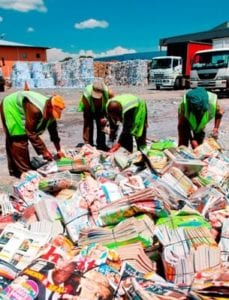According to the Paper Recycling Association of South Africa (Prasa), the pulp and paper industry is one of the largest employers in South Africa, making a significant annual contribution to the economy of some R35.26 billion.
Mpact, a leading player in the paper and plastic packaging industry, has and continues to create important employment opportunities in the sector. Empowerment and enterprise development is central to Mpact’s strategy for its recycling business. Mpact Recycling makes use of independent contract drivers to execute its recycling collection strategy. These owner-drivers transport the recovered waste material from various collection points right through to Mpact’s paper mills. Mpact also buys its recovered paper from more than 90 independent dealers throughout the country. According to John Hunt, managing director at Mpact Recycling: “Mpact Recycling’s broad national footprint includes community recycling and collection projects throughout South Africa – an essential element of enterprise development.” Mpact believes that it has an important role to play in ensuring that opportunities for entrepreneurs to establish and grow their businesses are made available. “Through our continued support we hope that these businesses will not only be sustainable, but will also lead to the creation of more job opportunities,” says Hunt. Piet Matentshi and Khombisile Buthelezi are respective business owners who have successful businesses, based on Mpact’s sustainable model of recycling. From truck driver to business owner Sixty-nine year old Matentshi from Springs has been running a successful business collecting recovered paper around Gauteng and delivering it to Mpact’s paper mills for over 10 years. Matentshi, who was previously a driver for an international packaging and paper group, was given an opportunity to start his business in 1998. This has not only afforded Matentshi the opportunity to run his business but has also enabled him to create employment opportunities for 10 other people. Matentshi owns two trucks and collects about 10 tonnes of paper from Monday to Friday. He collects recovered paper in the Randburg and Sandton areas as well as in Germiston, Edenvale and Alberton.“My day starts at 07:00 and only ends once I have finished all my collections in the respective areas. I have two drivers and eight assistants who work with me to recover paper for Mpact,” he says.
“Being my own boss has taught me to have self-discipline and perseverance. Budding entrepreneurs need to be aware that a successful business does not happen overnight. It takes a lot of commitment,” Matentshi advises. “The business of recycling is what has made the difference in my life. I have been able to provide for my family, buy a house and send my children to university,” he continues. “There is absolutely no stress in this business and I feel motivated to carry on. Greater participation is needed at a community level, which will create more jobs for others,” Matentshi states. Matentshi recently purchased two more trucks and plans to expand his business. Proud buy-back centre owner Khombisile Buthelezi is the proud owner of a buy-back centre in Alberton. Buthelezi received advice, training and equipment from Mpact before opening her business in January 2004. She currently employs three people who help her run the buy-back centre. Communities and hawkers in Alberton and surrounding areas such as Katlehong and Spruitview contribute to the successful running of this buy-back centre by delivering recyclable waste materials they collect. “My centre is open from 07:00 until 16:30, Monday to Friday and on Saturdays from 08:00 to 14:00. I collect paper, glass and plastic,” says Buthelezi. Mpact guarantees to purchase all the material that Buthelezi collects at her buy-back centre and in turn the continuity of her business. Hawkers and community members who wish to be involved in recycling can deliver their recycling directly to the buy-back centre and will be paid based on the weight of their collections. Clean-up Week is celebrated from 16 to 21 September. During this week, all South Africans are urged to do something towards increasing recycling rates.





